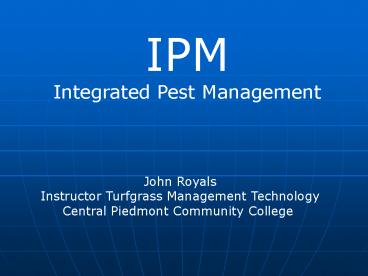IPM - PowerPoint PPT Presentation
1 / 43
Title: IPM
1
IPM Integrated Pest Management
John Royals Instructor Turfgrass Management
Technology Central Piedmont Community College
2
Definition IPM
The optimization of pest population management in
an economically and ecologically sound manner
through the use of multiple tactics compatible in
keeping pest damage below the aesthetic level
3
Tactics Used in IPM
- Monitoring
- Cultural
- Regulatory
- Physical
- Chemical
4
Aesthetic Injury Level
Defined as the lowest population density of pest
that will cause unacceptable aesthetic changes
5
- Aesthetic injury level can vary depending on the
value of the turf area - Highway right of ways
- Home lawns
- Sports fields
- Golf putting greens
6
Developing a IPM program
7
Step 1 Identify key pest
- Weeds
- Insects
- Diseases
8
- Key Weeds in Tall Fescue
- Crabgrass
- Bermuda grass
- Dallisgrass
- Assorted broad leaf weeds
9
Crabgrass
10
Bermuda Grass
11
Dallisgrass
12
(No Transcript)
13
- Key Insects in Tall Fescue
- Grubs
- Fall Army Worms
14
(No Transcript)
15
(No Transcript)
16
- Key Diseases in Tall Fescue
- Brown Patch
- Gray Leaf Spot
17
(No Transcript)
18
(No Transcript)
19
Gray Leaf Spot
20
Gray Leaf Spot
21
Step 2 Define the turfgrass Management Unit- the
turf ecosystem
22
The turfgrass management unit
- A single lawn
- Golf course
- Southeastern USA
Size of turfgrass management unit depends on the
mobility of the pest and its dispersal potential
23
Step 3 Develop reliable monitoring techniques
24
Monitoring depends on our ability to accurately
identify turf pest and measure the amount of
potential loss that can be caused by
each Scouting must be done on a regular bases
for weeds, insects, and diseases
25
Step 4 Establish aesthetic thresholds
26
- Thresholds level can vary
- By level of maintenance (low, medium, or high)
- Turfgrass grown
- Type of pest present
- You must also consider
- Budget restrictions
- Availability of water
- Fertilizer
- Pesticides
- And other cultural materials or equipment
27
Step 5 Develop descriptive and predictive models
of what pest are most likely to occur, when the
are expected to appear or become active, and the
amount of damage they can cause
28
- To develop a model for a pest we must know the
- Biology of the pest
- Ecology of the pest
- Epidemiology of the pest
29
Japanese Beetle
JAN-FEB Grub in winter cell.MAR-APR Grub comes
up near surface to feed.MAY Grub forms cell and
prepares to pupate.JUNE Grub changes to pupa
and then to adult, which emerges from
ground.JULY Beetle lays eggs in ground,
preferably in grass sod.AUG Eggs hatch. Young
feed on living roots of plants.SEP-OCT Grubs
continue to feed and grow rapidly. Injury to
roots of plants is most common at this
time.NOV-DEC Grubs are mostly full grown and go
to depths 4 to 8 inches below surface to pass
winter in earthen cell
30
Brown Patch Pressure On Tall Fescue
Time Disease Occurs
Brown Patch
31
- Weed Life Cycles
- Annual
- Biannual
- Perennial
32
Step 6 Develop an effective and economical turf
management strategy
33
- Turf areas need to be uniform to minimize
variation in response to the program - Front yard or back yard
- Shaded areas
- Wet areas
- Different soil types
- Etc
34
Management Tactics
35
Regulatory
36
Genetic
- Selection and use of adapted turfgrass species
and cultivars with naturally occurring resistance
to insects and/or diseases - Introduction of specific genes for resistance
into a desirable turfgrass
37
Cultural
- Sanitation
- Proper establishment of turf area
- Mowing
- Fertilization
- Irrigation
- Cultivation Practices
38
Biological
Living organisms that are natural antagonist,
parasites, and predators
- Examples
- Bacillus popilliae (Milky disease)
- Endophytes
39
Physical
- Traps
- Surface and subsurface drainage
- Control traffic
40
Chemical
- Herbicides
- Fungicides
- Insecticides
41
Summary
IPM It is a systematic approach to managing
pest, utilizing all control and monitoring
methods
42
Summary continued
- Developing an IPM program
- Know your pests
- Define the turf area
- Be on the lookout (scouting)
- Establish damage thresholds
- Know when and where your pest are coming to visit
- Develop and implement a turf management plan
43
Questions ?































